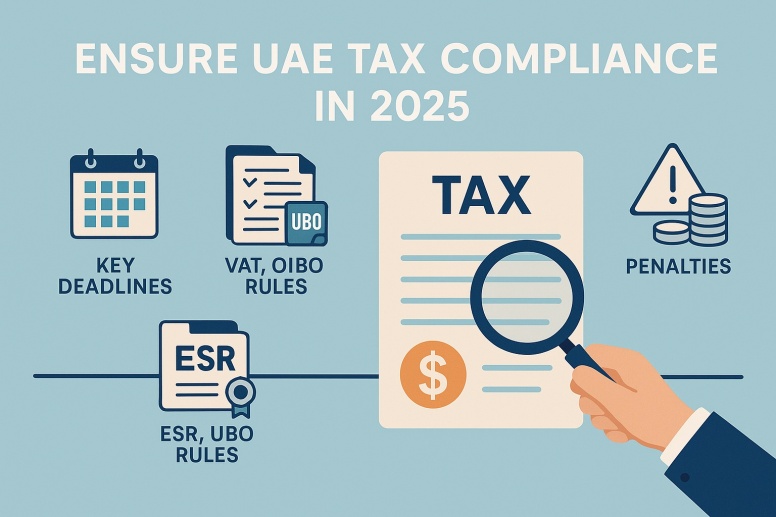
Understanding Business Tax Compliance In UAE
Tax compliance in the United Arab Emirates (UAE) has become a fundamental part of operating a business. Since the introduction of VAT in 2018 and the rollout of Corporate Tax in 2023, the UAE has moved toward a structured taxation regime aligned with international standards. Businesses are now required to register, file, and pay taxes within strict timelines set by the Federal Tax Authority (FTA).
Whether based in the mainland or a free zone, companies that fail to comply with these evolving requirements risk financial penalties, legal complications, and reputational damage.
The cost of non-compliance is not just financial; it puts your license, credibility, and growth at risk,” says Adnan Ahmed, Managing Director of Now Consultant.
This guide outlines the major tax regulations in place, key deadlines for 2025, the cost of non-compliance, and proven strategies businesses can adopt to stay compliant in a shifting regulatory landscape.
VAT in the UAE: Registration Thresholds, Rates, and Compliance Essentials
Introduced: January 1, 2018
Standard Rate: 5%
Mandatory Registration Threshold: AED 375,000
Voluntary Registration Threshold: AED 187,500
Value Added Tax (VAT) applies to most goods and services within the UAE. Businesses must register if their taxable supplies or imports exceed the mandatory threshold. VAT is filed either quarterly or monthly, depending on the turnover, and accurate invoicing, recordkeeping, and timely filing are key to staying compliant.
Corporate Tax in the UAE: What You Need to Know About the 9% Levy on Profits
Effective Date: June 1, 2023
Tax Rate: 9% on profits exceeding AED 375,000
Exemption: Income below AED 375,000 or qualifying free zone income
Small Business Relief: Available to businesses with revenue under AED 3 million (until 2026)
The Corporate Tax regime marks a significant shift in the UAE's fiscal structure. It aligns with international tax transparency standards, including the OECD’s BEPS framework. Businesses are expected to assess taxable profits, claim exemptions if eligible, and file accurate annual tax returns.
Excise Tax in the UAE: What Products Are Taxed and at What Rates?
Introduced: October 1, 2017
Applies to:
- Tobacco: 100%
- Energy drinks: 100%
- Carbonated drinks: 50%
- Sweetened beverages: 50%
Excise tax targets products harmful to human health or the environment. Manufacturers, importers, and stockpilers of such goods must register with the FTA, file periodic returns, and pay excise duties on time to avoid steep penalties.
Economic Substance Regulations (ESR): Annual Reporting Requirements for Relevant Businesses
Implemented: 2019
Applies to: Banking, insurance, shipping, holding companies, fund management, etc. Compliance Requirements: ESR Notification and ESR Report annually
Businesses carrying out relevant activities must demonstrate they have substantial economic presence in the UAE. This includes maintaining core income-generating activities, sufficient employees, premises, and expenditure in the UAE.
UBO Filing in the UAE: Disclosure of Ultimate Beneficial Ownership Is Mandatory
The UAE mandates that all businesses disclose their Ultimate Beneficial Owners (UBOs), the individuals who ultimately own or control a company. This measure is part of broader efforts to enhance financial transparency and combat illicit activity. Non-compliance can result in significant penalties and suspension of licenses.
2025 UAE Tax Compliance Deadlines: Important Filing Dates to Mark
| Tax Type | Filing Frequency | 2025 Deadline Example (FY ending Dec 31) |
|---|---|---|
| VAT | Quarterly/Monthly | Jan, Apr, Jul, Oct (by 28th) |
| Corporate Tax | Annually | Sept 30, 2025 |
| ESR Notification | Annually | June 30, 2025 |
| ESR Report | Annually | Dec 31, 2025 |
Timely submission of tax returns and regulatory disclosures is essential. Delays not only attract fines but may also flag a business for audit or investigation.
Tax Penalties in the UAE: Common Violations and Their Financial Consequences
| Violation | Penalty Amount |
|---|---|
| Late VAT Registration | AED 10,000 |
| Late VAT Return Submission | AED 1,000 (first offense), AED 2,000 (repeat) |
| Late VAT Payment | 2% immediately, 4% after 7 days, 1% monthly |
| Failure to File ESR Notification | AED 20,000 |
| Failure to Submit ESR Report | AED 50,000 |
| Inaccurate or Incomplete UBO Filing | AED 50,000 |
According to the FTA’s 2024 enforcement data, over AED 1.3 billion in penalties were imposed due to VAT-related non-compliance alone.
Common Tax Compliance Challenges UAE Businesses Face
A PwC UAE Tax Outlook Report (2024) found that:
- 41% of SMEs struggled to understand the Corporate Tax framework
- 36% had issues maintaining VAT-compliant records
- 28% were unaware of ESR filing obligations
- 22% faced penalties due to missed deadlines
Most issues stem from under-resourced finance teams, outdated accounting systems, and a lack of awareness of new obligations.
Practical Steps to Ensure Tax Compliance in 2025 and Beyond
To avoid penalties and maintain good standing with the FTA, businesses should:
- Use FTA-Approved Software: Automate invoicing, reporting, and filings.
- Hire Registered Tax Agents: Certified professionals can interpret regulations correctly and ensure complete compliance.
- Maintain Records for 5 Years: This includes invoices, contracts, and payment records.
- Track Regulatory Updates: The FTA regularly updates compliance guidelines.
- File and Pay On Time: Use internal systems or third-party services to ensure timely submissions.
Why Tax Compliance Matters for Web Design & Development Agencies in the UAE
Whether you're building sleek websites, managing client eCommerce platforms, or developing SaaS tools, tax compliance is now just as important as responsive design and clean code. Since the introduction of VAT and Corporate Tax, digital agencies operating in the UAE—mainland or free zone—must meet strict Federal Tax Authority (FTA) filing and reporting standards. Many web studios are small teams focused on creative output, but overlooking financial compliance can result in penalties, revoked licenses, or lost client trust. From charging VAT on services to understanding exemptions for free zones, agency owners, freelancers, and startups in the tech and design space need to align their business operations with the UAE’s evolving tax laws. Automating invoicing, using FTA-approved accounting tools, and working with certified tax agents should be part of your business strategy—just like SEO, UX, or page speed.
As the UAE strengthens its tax infrastructure in line with global standards, businesses, whether startups, SMEs, or multinationals, must prioritize compliance as a strategic necessity, not just a regulatory requirement. From VAT and Corporate Tax to ESR and UBO disclosures, the legal framework is clear, and the penalties for non-compliance are significant.














